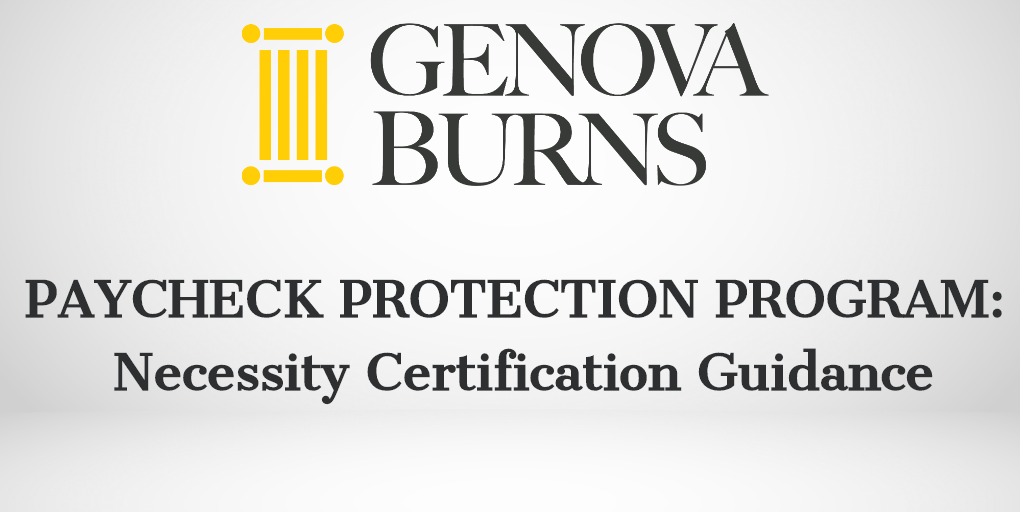SBA Finally Issues Anticipated Further Guidance on Borrower’s Good Faith for Certification of Necessity
May 13, 2020 | By: Keith A. Krauss, Esq.
Minutes ago, the Treasury Department released an update of the Program FAQs for the Paycheck Protection Program, addressing Question 31, which had imposed a heightened, but uncertain, standard of need on borrowers, suggesting many may need to return funds by May 14, 2020. In this morning’s update, they state:
- Recipients, which together with its affiliates, receive PPP loans with an original principal amount of less than $2 million will be deemed to have made the required necessity certification in good faith.
- Recipients who received $2 million or more may still have an “adequate basis” for making the required good faith certification, based on their individual circumstances. They will be subject to review by the SBA and if the SBA determines that the borrower lacked an adequate basis (i.e. determines certification was not, in fact, in good faith), will require that the funds be repaid immediately. The SBA stated that it will not pursue administrative enforcement or referrals to other agencies on the basis of its determination of no adequate basis as long as the borrower that is determined not to be eligible immediately repays the loan after receiving notification from the SBA.
Takeway: We continue to advise that businesses that received $2 million or more (across its affiliates), complete their analysis as to need now, looking at their business operations, financial projections, and other relevant information pertaining to the continuity of your business operations and prepare a complete file as of 5/14/20 which fully documents the analysis and includes supporting documentation accordingly reflecting your basis/es for need. If, based on this analysis, there is no reasonable adequate basis for need, then businesses have until tomorrow, May 14, 2020, in which to return funds.
Please see below for the full text of the newly added Q&A:
Question: How will SBA review borrowers’ required good-faith certification concerning the necessity of their loan request?
Answer: When submitting a PPP application, all borrowers must certify in good faith that “[c]urrent economic uncertainty makes this loan request necessary to support the ongoing operations of the Applicant.” SBA, in consultation with the Department of the Treasury, has determined that the following safe harbor will apply to SBA’s review of PPP loans with respect to this issue:
Any borrower that, together with its affiliates, received PPP loans with an original principal amount of less than $2 million will be deemed to have made the required certification concerning the necessity of the loan request in good faith. SBA has determined that this safe harbor is appropriate because borrowers with loans below this threshold are generally less likely to have had access to adequate sources of liquidity in the current economic environment than borrowers that obtained larger loans. This safe harbor will also promote economic certainty as PPP borrowers with more limited resources endeavor to retain and rehire employees. In addition, given the large volume of PPP loans, this approach will enable SBA to conserve its finite audit resources and focus its reviews on larger loans, where the compliance effort may yield higher returns.
Importantly, borrowers with loans greater than $2 million that do not satisfy this safe harbor may still have an adequate basis for making the required good-faith certification, based on their individual circumstances in light of the language of the certification and SBA guidance. SBA has previously stated that all PPP loans in excess of $2 million, and other PPP loans as appropriate, will be subject to review by SBA for compliance with program requirements set forth in the PPP Interim Final Rules and in the Borrower Application Form. If SBA determines in the course of its review that a borrower lacked an adequate basis for the required certification concerning the necessity of the loan request, SBA will seek repayment of the outstanding PPP loan balance and will inform the lender that the borrower is not eligible for loan forgiveness. If the borrower repays the loan after receiving notification from SBA, SBA will not pursue administrative enforcement or referrals to other agencies based on its determination with respect to the certification concerning necessity of the loan request. SBA’s determination concerning the certification regarding the necessity of the loan request will not affect SBA’s loan guarantee.
For additional help and guidance, please contact firm Counsel Keith A. Krauss, Esq. at kkrauss@genovaburns.com or Associate Young-Ji Park, Esq. at ypark@genovaburns.com or 973.533.0777.
Tags: GENOVA BURNS LLC • Young-Ji Park • Keith A. Krauss • COVID-19 • PPP


.jpg)